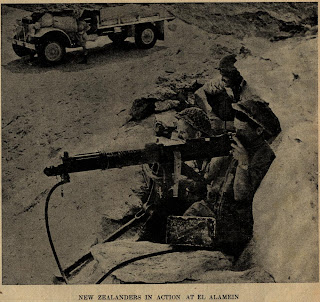2nd Battle of El Alamein
Sixty years ago, the 2nd Battle of El Alamein, the battle that turned the war towards the allies' favour, was fought in North Africa. Recent commemorations saw New Zealand veterans invited to the El Alamein Commonwealth War Graves Cemetery in Egypt to remember New Zealand and allied forces; fortunately many of their stories now live on in the written and oral histories.
George Mackay from Westport fought at Tripoli and in The Desert Rd recounts the thoughts that go through one’s mind leading up to battle. “You don’t know what to expect.. . It’s an uncanny moment, zero hour. Everything’s going through your mind, whether you’ll survive, whether you’re going to get killed, blown up or shot at, or anything like that. What’s going to happen? What’s it going to be like? You don’t know. All those things are going through your mind and then finally its zero hour and the shelling starts. Then you’re waiting for the Germans to retaliate with their shells. That’s what it’s all about. You don’t know what’s going to happen and then it all does happen” ('The Desert Road' edited by Megan Hutching, p.251).
And British Charlie Potts, known as the Fighting Parson sums up battle like this: “Some of the most unlikely men have shown themselves to be heroes and some of the plausible ones have been discredited.” ('El Alamein' by Bryn Hammond, p.278).
Among the heritage collection of war histories at Auckland Libraries are 'El Alamein: The Battle that Turned the Tide of the Second World War', Bryn Hammond (2012) and 'The Desert Road: New Zealanders Remember the North African Campaign', Ed: Megan Hutching (2005).
By Joanne Graves, Auckland Research Centre
George Mackay from Westport fought at Tripoli and in The Desert Rd recounts the thoughts that go through one’s mind leading up to battle. “You don’t know what to expect.. . It’s an uncanny moment, zero hour. Everything’s going through your mind, whether you’ll survive, whether you’re going to get killed, blown up or shot at, or anything like that. What’s going to happen? What’s it going to be like? You don’t know. All those things are going through your mind and then finally its zero hour and the shelling starts. Then you’re waiting for the Germans to retaliate with their shells. That’s what it’s all about. You don’t know what’s going to happen and then it all does happen” ('The Desert Road' edited by Megan Hutching, p.251).
Dunedin doctor, Lawrence Wright, a medic at El Alamein, remembers this harrowing incident of a seriously wounded boy. “We kept giving him morphine and it didn’t seem to make any difference to him. One of our younger doctors was looking after him, but couldn’t get anywhere so he called in our senior man. He had a good look at him and drew up some morphine in a syringe. I remember him saying, “I’m going to give you this injection and you’ll have a lovely sleep and when you wake up you won’t feel any pain at all.” He gave him the injection. Finish. It’s pretty shattering when you’re there on the spot and you see it all happening. I admired him for his courage in taking the decision. I don’t think I would have had the courage to have taken it myself” ('The Desert Road' edited by Megan Hutching, p. 239).
 |
| Ref: AWNS-19430901-21-2, Sir George Grey Special Collections |
 |
| Ref: AWNS-19430901-21-3, Sir George Grey Special Collections |
By Joanne Graves, Auckland Research Centre

Comments
Post a Comment
Kia ora! Please leave your comment below.